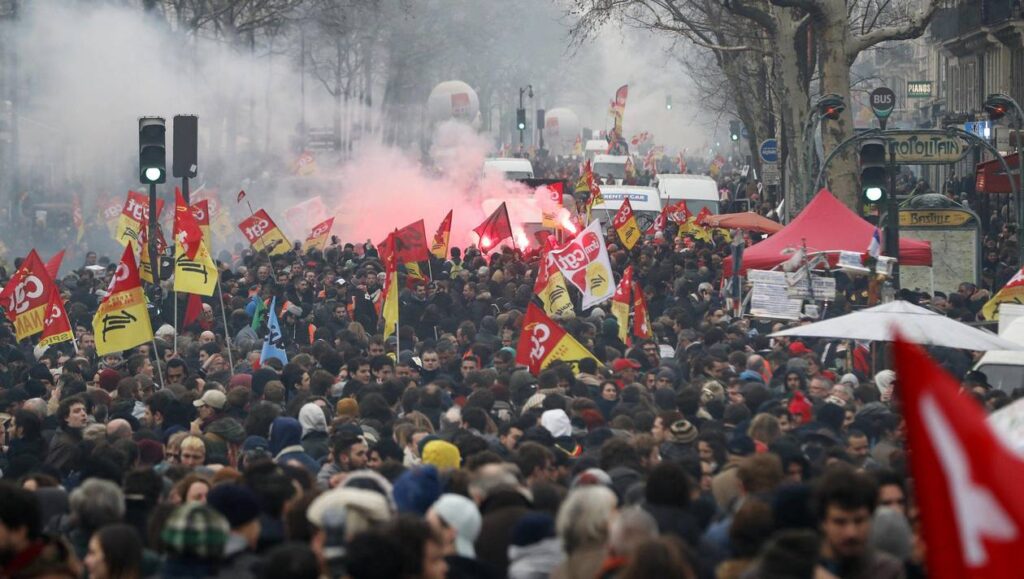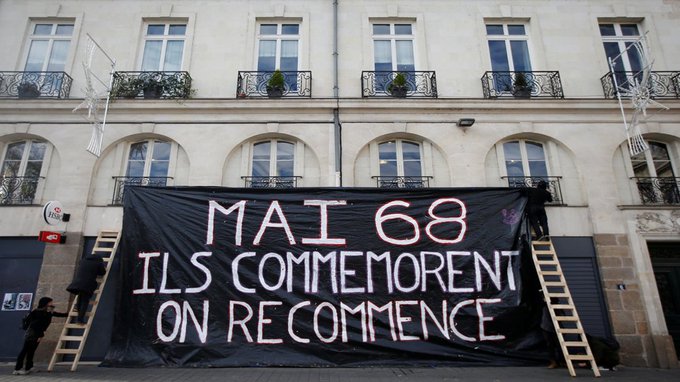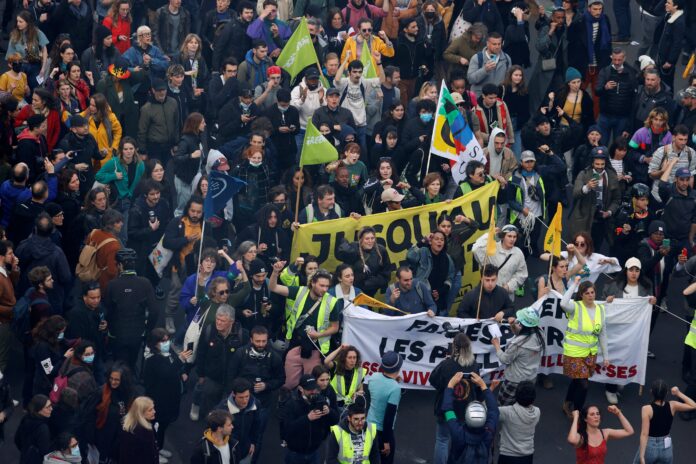The movement against the pension reform in France has now gone on for 5 months and despite the fact that the reform has been passed in a “coup d’état” by Macron, workers continue to mobilise and react. This is a very important movement that inspires and radicalises layers of workers in France while being followed by broad layers of workers internationally.
In this context, we spoke to Corina Kapetanaki, who lives and works in France, to give us a picture on what is happening there.
ISp: Corina, since the beginning of the year, French society has been in turmoil and involved in the extremely dynamic and massive strike movement against the law raising the retirement age from 62 to 64. Can you tell us a few words about your experience of being part of this movement?
CK: First of all, it is important to clarify that the limit of 64 years is for those who will have completed 42 to 43 years of work. For the rest it will be 67, with the risk that many will have to accept a reduced pension.
Also, the current movement is in a way a continuation of a similar movement that was started in late 2019 and was halted in February 2020 before the pandemic. The reactions then were again about pension reform but the content of the reform was not exactly the same as the current one. The area that was particularly mobilised at the time was public transport with massive strikes: for 2-3 months, commuting in Paris was mainly done on foot or by bicycle. But those strikes had a lot of support from most people and the propaganda motto that “we are being held hostages” did not get through. There had also been very massive demonstrations. Macron then withdrew the bill at the beginning of the pandemic.
The protests then were very important but the current movement is the most dynamic in the last 20 years. I am participating in it by striking and taking part in the marches. The movement of course expresses itself more massively on the street with demonstrations and less with strikes. Many people came to the marches for the first time in their lives, the term “primo manifestants” was even created. There were of course sectors where there were very massive strikes such as education and the refineries.
ISp: On April 15, Macron signed and enacted the pension law. In order to be able to get it through, he had to resort to the activation of article 49.3 of the Constitution to avoid a parliamentary vote, since he feared leaks from Sarkozy’s party. What impact has this tactic had on the public conscience?
CK: A very important one! The Prime Minister said, more or less, we gave up and saw that there would be no majority, so we did not go ahead with the vote! And 49.3 allowed them to impose it because, as they repeated many times, this law was “necessary”.
For some it created a “before 49.3” and “after 49.3” moment. The reformist trade union CFDT had stated that it would not continue to participate in the mobilisations if the law was passed as normal.
The already great anger flared up even more. After such unprecedented and long-lasting mobilisations, with the unions united for the first time in a long time and with MPs willing to vote against it, the government was showing its authoritarian face. This tactic was recorded as clearly undemocratic even by people who were not particularly politicised.
Also, from that moment onwards, young people, students and pupils began to mobilise even more vigorously. This movement is strongly registered in the consciousness of many young people.
After 49.3 many people took to the streets outside the demonstrations planned by the trade unions, often at night and in places closer to the parliament. In these rallies and marches there was enormous police violence aimed at intimidation.

All human and social rights organisations and the State Ombudsman have denounced this unprecedented violence and expressed their concerns. Hundreds of abusive arrests were made, often of young children, and some serious physical injuries were caused.
What is very important is that all these go beyond the issue of pensions. It seems that something important is also happening at the level of political and social consciousness. The government’s propaganda is not working and a lot of people are talking about the great social inequalities that this law encourages even more. It is now recognised that it is a very unfair law and that other ways of funding could be found. It has also opened up the debate on difficult working conditions. One of the most dynamic strikes was that of the refuse workers.
ISp: In the days following Macron’s signing of the pension reform, we again saw very massive mobilisations and marches. What is the mood of the working class today?
CK: On the one hand there is certainly a frustration and on the other hand there is a desire to continue the struggle and not to let this authoritarian change go unanswered.
The most recent important mobilisation was the May Day marches which were of a similar size to the largest marches of recent months. There are also many spontaneous demonstrations of disapproval. For example, protests with pots and pans in places that Macron visits.
ISp: The fact that the pension reform is now law makes the struggle to overturn it more difficult. What is the attitude of the trade unions and left-wing organisations? Is there a plan and a willingness to continue the struggle?
CK: The trade unions have already published the date of the next mobilization, which is June 6, stressing that the struggle continues.
There have also been two requests for a referendum at the Constitutional Council but both times they have been rejected.
It is difficult to say how this movement will develop, as it is also difficult to make an exact account of the legacy it will leave behind.
However, I believe that leaps have been made in terms of social and political consciousness in a very large part of society. The fear is that this will not be expressed in the same way in the next elections.

ISp: In the last period we have seen far-right/fascist forces regrouping in France, and on May 6 we saw a few hundred fascists taking to the streets and demonstrating. What is their influence and how is the antifascist movement reacting?
CK: This is true. Also, Le Pen’s popularity seems to be growing lately. She has managed to be seen to oppose the bill in question without, of course, any connection to the movement. She appears as more moderate than her father and at the same time presents herself as the political force that condemns chaos and disorder.
As regards to the demonstration on May 6, which the Prefect of Paris allowed, there was a great deal of opposition to the extent that the Minister of the Interior asked all prefects to ban all demonstrations by far-right organisations from now on. In this way, he is exposing the Prefect of Paris, who had stated that he did not have enough evidence to ban the demonstration on May 6 and that he did not consider that there was a risk of public disorder! Many organisations, parliamentarians and lawyers reacted by saying what should go without saying: that fascist ideology itself disturbs public order.
Also, many journalists find it difficult every year to cover and have information about this meeting since they are threatened and prevented in every way from doing their work. The same thing happened on Saturday. And the attacks are not only on journalists. In recent months, attacks against political opponents, anti-fascists and people belonging to minorities have increased.
The next fascist event has been set for Saturday, May 13. The fascists of Action Française (a reactionary pro-monarchist, racist, anti-Semitic group) are preparing for their conference on “France in danger” in a very central place in the 12th arrondissement of Paris.
Many organisations are opposed to this and are calling for a protest on the same day near the place where this event will take place.
Action Française has grown stronger in recent years, having managed to recruit many members and open offices in many cities. It is a particularly dangerous group, very violent, which attacks immigrants, LGBTIQ people, occupied high schools and universities, while at the same time they have tried to infiltrate marches.
At the same time, on the other hand, various gatherings are banned, such as some rallies against the pension bill and the gathering on May 29 outside the Stade de France where Macron was to attend the 2023 Coupe de France final. Previously, an event in solidarity with migrants (2021) and a demonstration against the Sécurité Globale law (2020) were banned.



